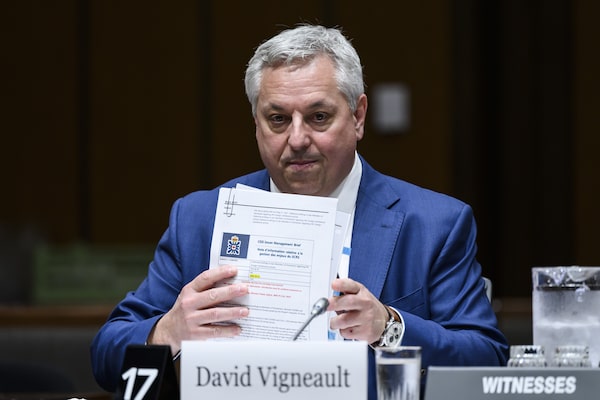
David Vigneault, Director of the Canadian Security Intelligence Service (CSIS), prepares to appear before the Standing Committee on Procedure and House Affairs (PROC) on Parliament Hill in Ottawa June, 2023.Justin Tang/The Canadian Press
Canadian Security Intelligence Service Director David Vigneault cast doubt on the notion that Prime Minister Justin Trudeau’s government wasn’t fully informed of CSIS intelligence on Chinese state meddling in the 2019 and 2021 federal elections, and defended the conduct and work of the spy agency.
Mr. Vigneault made his comments at the Foreign Interference Commission on Friday, where he was testifying for a second time. His appearance concluded the commission’s two weeks of public hearings on foreign interference in Canadian elections.
The CSIS director first appeared before the public inquiry last week, but Quebec Court of Appeal Justice Marie-Josée Hogue, who is leading the commission, decided to summon him back so that he could respond to testimony from Mr. Trudeau’s top aides.
Those aides told the inquiry on Tuesday that, during a 2023 intelligence briefing, CSIS had not warned them about interference in the past two elections. Mr. Trudeau himself testified on Wednesday that Mr. Vigneault did not relay specific warnings mentioned in notes prepared for an October, 2022, briefing. The notes dealt with clandestine election meddling by China, and the Canadian government’s lack of strong countermeasures.
In his testimony to the public inquiry, Mr. Trudeau played down the reliability of information gathered by CSIS, including the content of the 2022 briefing notes. The document, which was made public at the inquiry, said Beijing had “clandestinely and deceptively interfered” in both elections.
Trudeau aide Jeremy Broadhurst told the inquiry on Tuesday that certain messages in the briefing notes had never been delivered. “This stuff has never been said to us,” he said. “We’ve never heard language like the stuff that is in this document.”
Mr. Vigneault said on Friday that he did not relay the comments contained in the briefing notes because he was discussing very specific incidents of foreign interference with the Prime Minister.
Still, he said, he repeatedly told Mr. Trudeau and his cabinet that foreign interference by China in the past two elections was clandestine and deceptive, but did not affect the overall results of the elections.
“It is indeed something that I communicated,” he said. “In our assessment we saw foreign interference in both the 2019 and 2021 elections.”
In an apparent rebuttal to the Prime Minister, Mr. Vigneault defended CSIS’s intelligence work.
“What is important to remember is that this is done by professional, trained intelligence analysts and professionals that are bringing this together,” Mr. Vigneault said. “I’m extremely proud of the work that the intelligence professionals of CSIS do every day in Canada, and around the world, in very dangerous situations, to protect Canadians and make sure that we are safe and secure in a prosperous country.”
Mr. Vigneault pushed back on the idea that CSIS did not inform the Liberal government that Canada is slower to respond to foreign interference than its allies in the Five Eyes intelligence-sharing alliance: the United States, Britain, Australia and New Zealand.
He said he had told the government that Canada’s lack of strong countermeasures to foreign interference makes such meddling a “low risk and high reward” endeavour for hostile actors.
“I can say with a high degree of confidence that I used these examples in both private briefings, but also in public speeches,” he testified.
The foreign interference inquiry was announced by the federal government in September, after months of reporting by The Globe and Mail and other media on meddling by China in Canadian democracy, including the 2019 and 2021 elections.
Justice Hogue has until May 3 to table a report on election interference. The commission is scheduled to hold another set of hearings, with a broader focus on democratic institutions, in the fall. A final report is due at the end of December.
Mr. Trudeau has dismissed foreign interference, particularly in the 2021 election. He, like Mr. Vigneault, has said the overall results of that election, in which the Liberals were returned to government with a minority, are not in doubt.
But Erin O’Toole, who led the Conservatives during the 2021 election, has claimed that his party lost as many as nine seats that year because of China-led disinformation activity. He told the inquiry last week that he believes the Conservatives were targeted by Beijing because their platform included proposals intended to curb Chinese influence, such as a call for a registry of foreign agents.
A document tabled with the inquiry showed that, in the week before the 2021 election, a unit of the Department of Global Affairs observed what the group considered a possible “information operation” by the Chinese Communist Party, aimed at discouraging Canadians of Chinese heritage from voting Conservative. There is no indication that Mr. O’Toole was informed of this by government officials overseeing the election’s integrity.
Mr. Vigneault said he had briefed the government on attempts by China to orchestrate disinformation campaigns against Mr. O’Toole and Kenny Chiu, a Conservative MP who lost his seat in the 2021 election.
At a housing announcement in the Greater Toronto Area on Friday, Mr. Trudeau was asked whether he has trust in the intelligence provided by Mr. Vigneault.
“I have tremendous trust in our intelligence agencies,” the Prime Minister said, adding that in his opinion “no government in the history of this country has ever taken foreign interference as seriously as we have.”
With a report from Laura Stone